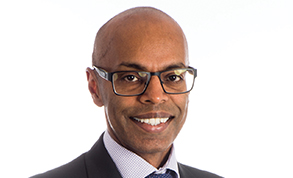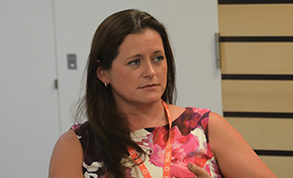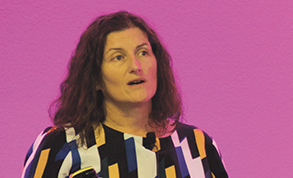Diversity: financial equals
It is no secret that while women and people from a black and minority ethnic (BAME) background make up significant proportions of the NHS finance workforce, they are not well represented in the most senior jobs. This could be due to a number of factors – bias (conscious or unconscious); the self-perpetuating cycle of a shortage of role models; lack of confidence or opportunity. Regardless of how it has happened, the NHS finance function is determined to address inequality, starting with race and gender, with two schemes launched recently in England.
NHS Future-Focused Finance (FFF) and NHS Improvement are developing programmes to tackle discrimination in the finance function. They aim to be complementary, with FFF – in partnership with other organisations including the HFMA – delivering much of the support
on the ground.
The evidence that there are problems with equality were reinforced in the last two NHS finance function censuses in 2015 and 2017. While women outnumbered their male colleagues in every grade up to and including band 8b, men dominated the higher grades. In 2015, 26% of finance directors were women. This rose to 28% in 2017, but was still low compared with the overall make-up, where women accounted for 61% of the finance workforce. Two-thirds of women working in NHS finance were at band 6 and below, compared with 46% of men.
Data on ethnic mix changed little between 2015 and 2017, with 70% of the NHS finance workforce in England saying they were white British. Some 86% of finance directors were white British. Nationally, 11% of organisations did not disclose their employees’ ethnicity.
Edward John, FFF diversity programme lead, says the large accounting and consultancy firms were leading the field when it came to action on diversity, but the NHS faced being left behind. He says no-one knows why NHS finance lags behind – the big firms have looked into their recruitment, performance management and talent identification and development. But the other side of the coin is how the people in protected groups feel.
FFF organised two safe-house discussions for NHS finance staff below director level in the summer – one for women, the other for BAME groups. Common themes emerged, Mr John says. ‘There was a lack of identifiable and relatable role models and the groups said we need to hear from these individuals. They didn’t seem visible to many people in the groups.’
For women, striking a good work-life balance was one of the biggest issues. Employers often paid no more than lip service to helping balance childcare or other carer duties with their career. ‘But when it comes down to it, it doesn’t really happen,’ says Mr John. ‘There’s always something stopping it happening.’
Other experiences of discrimination were perhaps more subtle, he says. ‘Some said that if they, as a woman, walk into a meeting they are expected to take notes. For me, that was shocking to hear and, though it’s good for it to come out, we must challenge these behaviours.’
The BAME group spoke of a lack of confidence to apply for jobs and a feeling that senior posts were ‘a closed shop’. Again, there was a lack of role models. Mr John adds: ‘Unconscious bias and even conscious bias came up as a significant barrier.’
London scheme
In addition to the FFF work, a scheme that started life in London will now be rolled out across the country with the backing of NHS Improvement chief financial officer Elizabeth O’Mahony. The Going beyond scheme will sit alongside the FFF work and the regional talent management programme.
It began when NHS Improvement London region director of finance Jeff Buggle asked Sandra Easton, chief financial officer at Chelsea and Westminster Hospital NHS Foundation Trust, and Hardev Virdee, Central and North West London NHS Foundation Trust chief finance officer, to examine the diversity problem in the capital’s finance function. Initially, it is focusing on gender and ethnicity.
Going beyond is working with the HFMA London Branch to implement the programme in the capital and will cover providers, commissioners and regulators.
In London, women make up 50% or more of finance staff up to and including band 8a. In some lower bands, the difference is stark – in band 3, they account for around 75% of staff and two-thirds of band 4s. But in more senior roles, the picture is turned on its head. While women make up just over half of band 8a staff, from band 8b the proportion declines, with more men in the most senior roles – only one in six finance directors in the capital are women.
The picture for BAME finance staff is similar – they make up between 15% and 20% of bands 1 to 8a, but this declines to 13% of 8bs and around 4% of directors.
Anonymous quotes collected by Ms Easton and Mr Virdee for a recent meeting of national finance directors showed the depth of the problem. One acute finance director, for example, believed a woman could not do his job. A woman spoke of a verbal offer not materialising once the potential employer discovered she had a child. A deputy finance director felt an event for finance directors looked like an exclusive club with no-one who looked like them. Recruitment consultants advised people they would not ‘fit in’ with a board because of their backgrounds.
‘We could have put pages and pages of quotes like these in our presentation,’ Mr Virdee says. ‘But the people affected are more interested in knowing what’s going to change, rather than looking back – what’s going to change to make it easier for their career and people around them? We’ve got to recognise there’s a problem and now is an opportune time to resolve it.’
 Ms Easton believes recruitment consultants must be asked to improve their approach. ‘People who are gatekeepers, like recruitment consultants, are failing to give equity of access so we must get it out to them that this is not acceptable.’
Ms Easton believes recruitment consultants must be asked to improve their approach. ‘People who are gatekeepers, like recruitment consultants, are failing to give equity of access so we must get it out to them that this is not acceptable.’
FFF has almost completed drawing up a diversity code of conduct for recruitment consultants and hopes to roll this out soon.Going beyond is deliberately targeted at senior posts – at 8b and above – and FFF will support this work, as well as looking to encourage greater diversity across all grades. Mr Virdee says FFF will play a key role in rolling out Going beyond. ‘FFF is well equipped to make that happen.’
They will also work with professional accountancy bodies, accountancy firms and other groups such as the HFMA. The idea is for Going beyond to expand the cohort of women and ethnic minority staff at senior levels. With more role models in place, and capitalising on the fact that decision-makers tend to appoint staff that look like them, the effect should trickle down to the lower grades. It will then move on to other inequalities.
Edward John says the biggest difference between the NHS finance function and the big accounting firms is that the latter generally have diversity indicators built into their performance management. ‘We’re pushing for that to change and will look for some mandatory processes.’
The Rooney rule in American Football, for example, states that at least one shortlisted candidate for senior football management jobs, including head coach, must have a BAME background. It has led to a significant increase in the number of black coaches since its introduction in 2003. Mr John adds: ‘We are not saying we should do that, but it’s something that should be on the table and up for discussion.’ He says FFF will support the provision of training and education to break down barriers.
Going beyond will conduct a national annual census and aims to see a 10% year-on-year improvement nationally across all grades until the finance function reflects the population on gender and ethnicity.
At regional level, it will target a 10% year-on-year increase in finance directors on both counts until reflective of both gender and ethnicity. And at organisation level, Going beyond hopes for a 10% year-on-year improvement at bands 8b and above.
Ms Easton and Mr Virdee recognise that organisations and regions will start from different places. However, they argue it’s important for all organisations to push ahead with the work. ‘At regional level, the 10% year-on-year improvement could be one post. I think that makes it achievable,’ Ms Easton says.
There will be a number of initiatives to help finance departments, including shadowing and restructuring of leadership programmes to reflect greater diversity. Sponsorship – where a senior member of staff actively promotes a protégé, introducing them to a wider network – and mentoring will be important in Going beyond and FFF’s programme.
Positive feedback
The national finance directors have shown enthusiasm about the scheme and a number have already stepped forward, wanting to be involved or to become sponsors. ‘Sponsorship is much more of a commitment than mentoring,’ Ms Easton says. ‘It’s so valuable as there is a one-to-one relationship, whereas a mentor might have two or three mentees. They will get to know the people they sponsor and, when the time is right, put that person forward when finance director jobs come up.’
There will also be a focus on ensuring women and those from a BAME background who are capable of stepping up have the required soft skills. This could mean experience of chairing a meeting, influencing non-executives or making a presentation on complex issues.
These skills are not taught to finance professionals, Mr Virdee says. ‘We feel we have hundreds of finance directors in the privileged position of being able to deliver that [training] using their experience and knowledge.’
FFF also aims to include diversity indicators in its accreditation and aspiring leader programmes.
‘We must ensure we are in there, making sure the selection process is fair. It’s about getting the right person for the job – it isn’t about positive discrimination, it’s about ensuring we are using all the talent that’s available to us,’ Mr John says.
FFF programme director David Ellcock says the diversity workstream is a vital element of the Future-Focused Finance workstreams. ‘The Financial Leadership Council’s strategic aims cannot be achieved if we don’t have diversity underpinning everything we do. But we need organisations and individuals to support what we are trying to achieve.
‘We want to ensure that organisations that want to be seen as good finance organisations take diversity seriously. Diversity will sit front and centre in the accreditation process,’ says Mr Ellcock.
The workforce and leadership theme will help build networks and ensure that there is no closed shop when it comes to recruitment, Mr Ellcock adds. The FFF future leaders work programme will be key to bringing forward women and BAME finance directors and it has already helped talented finance professionals from these groups get their first finance director jobs.
The engagement and development theme team is working with the Skills Development Network to ensure equity of access to staff development tools. Diversity issues will also be a part of the FFF work with PwC on how the finance function will look in the future.
The NHS finance function is determined to take steps to ensure, over time, that its senior leadership better reflects the make-up of its workforce in terms of gender and ethnicity. This is just the start and the agenda will move on to other elements of diversity. While some performance management levers will play a part, and organisations will start from different points, finance leaders hope the function will embrace the diversity agenda because it is the right thing to do.
Diversity metrics
The HFMA and FFF have developed a range of diversity metrics and have issued individual reports to all NHS organisations that completed the 2017 NHS finance census.
The reports show an analysis of the organisation’s finance staff by gender and ethnicity, compared with the national and regional picture. The metrics are as follows:
- Percentage of females in the finance function
- Percentage of females at band 7 and above
- Percentage of flexible working patterns supported
- Percentage of finance staff from a BAME background
- NHS finance by gender and band
- Percentage of females at band 8d and above
- Percentage of finance staff working part-time
- Percentage of finance staff from a BAME background at band 7 and above.
Derbyshire diversity
Derbyshire Healthcare NHS Trust is working to ensure it is inclusive and diverse.
 Claire Wright (pictured), the trust’s deputy chief executive and director of finance, says it is important to offer staff a positive work environment – perhaps aiding recruitment and retention – and ensuring that all patients and staff feel comfortable to be themselves.
Claire Wright (pictured), the trust’s deputy chief executive and director of finance, says it is important to offer staff a positive work environment – perhaps aiding recruitment and retention – and ensuring that all patients and staff feel comfortable to be themselves.
She acknowledges that the trust’s workforce race equality standard (WRES) data is not as good as it wants it to be and its black and minority ethnic network is supporting the trust to deliver on an improvement action plan.
She is a reverse mentee – a programme where senior staff are mentored by more junior staff with a different ethnicity. The initiative disrupts the traditional power hierarchies and mentors and mentees speak openly about challenging issues in a safe environment. ‘The BAME member of staff is the expert and they are the person I am learning from,’ she says. ‘When I meet with my mentor, Bal, I always come away energised and inspired.’
At present, the reverse mentoring pilot is confined to executive board members, but the trust plans to roll it out across the trust following evaluation of the pilot with the University of Nottingham.
The trust has also set up an LGBT+ network earlier this year and Ms Wright says the trust is proving its commitment to improving LGBT+ inclusion in many ways. ‘We chose to use the + in the network name because it recognises that we don’t all fit into simple boxes,’ she says.
‘The UK has come a long way, but there is still a way to go to eliminate LGBT+ discrimination and to be fully inclusive of sexual and gender diversity.
‘At the trust, we are doing lots of things. For example, as part of the induction for all new staff we set the tone at day one by emphasising the fundamental importance to us of equality, diversity and inclusion in our trust.’
She adds: ‘We openly promote our LGBT+ support not just to our colleagues but also to individuals and families who receive our services. I believe that everyone can make a positive difference – whether they are part of the LGBT+ community themselves or whether they are allies, we all play a part.’
Related content
We are excited to bring you a fun packed Eastern Branch Conference in 2025 over three days.
This event is for those that will benefit from an overview of costing in the NHS or those new to costing and will cover why we cost and the processes.